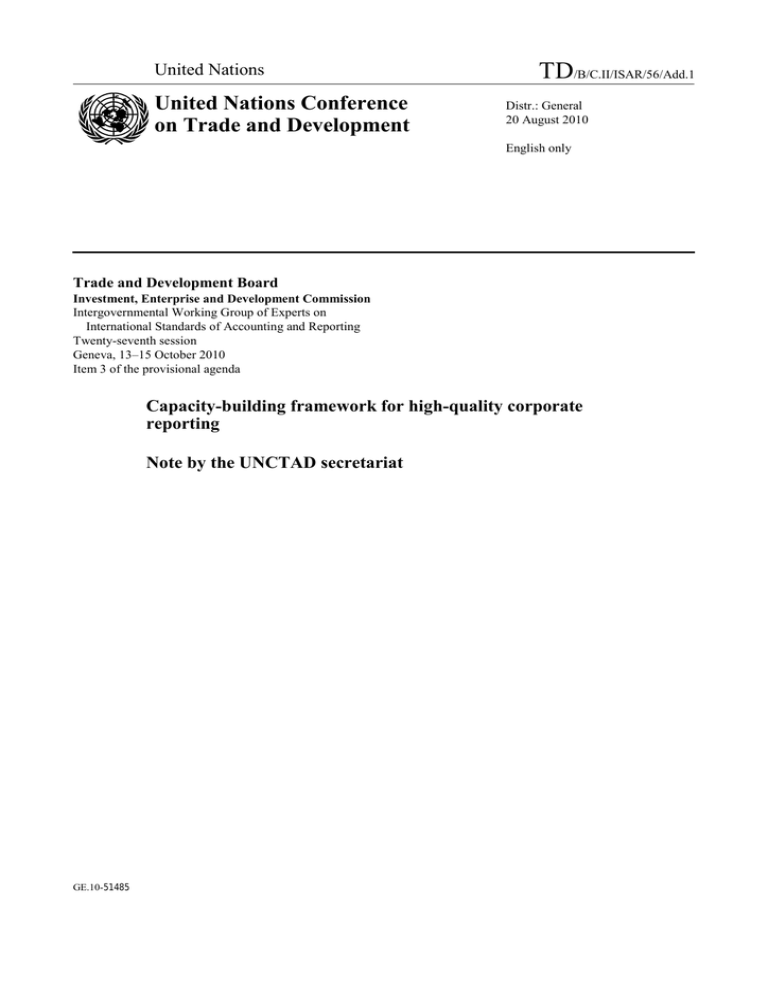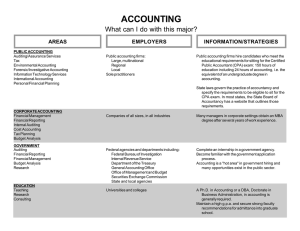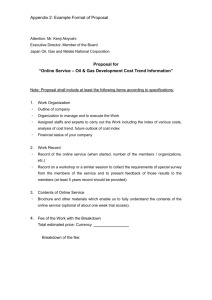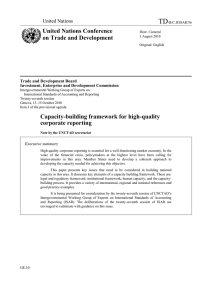TD United Nations Conference on Trade and Development United Nations
advertisement

United Nations United Nations Conference on Trade and Development TD/B/C.II/ISAR/56/Add.1 Distr.: General 20 August 2010 English only Trade and Development Board Investment, Enterprise and Development Commission Intergovernmental Working Group of Experts on International Standards of Accounting and Reporting Twenty-seventh session Geneva, 13–15 October 2010 Item 3 of the provisional agenda Capacity-building framework for high-quality corporate reporting Note by the UNCTAD secretariat GE.10-51485 TD/B/C.II/ISAR/56/Add.1 Contents Page Appendix I. Capacity-building framework for high quality corporate reporting - matrix................................................................................. 3 Appendix II. Core standards and benchmarks ............................................................................................... 5 Appendix III. Sample structure of a regulatory framework.......................................................................... 7 Appendix IV. Performance measurement and key questions for surveys .................................................... 8 Appendix V. List of members of the Consultative Group on capacity-building framework for high quality corporate reporting ....................................... 11 2 Appendix I. Capacity-building framework for high-quality corporate reporting – matrix Performance measurement Capacity framework Pillar structure Legal and regulatory Stages/checklist Accounting records Internal controls/audit Elements International standards Reference/guidance Regulation Fin/Non-Fin Statutory Framework IOSCO UNCTAD SMEGA 3 Milestones & indicators Endorsement of standards IFRS OECD Principles See Appendix IV Prepare fin. statements Enforcement ISAs, IESs below Approve fin. statements Monitoring XBRL EU Directives S.Ox and other similar national frameworks Audit Licensing Basil Comm. COSO Bank codes Publication/filing Governance IAIS Users, analysis Ethics OECD Principles Multi-reporting frameworks Monitoring, oversight, enforcement Requirements govt. enterprises & individuals Key questions for surveys See Appendix IV below. GRI Compliance World Bank ROSCs Investigation & discipline IIA Quality assurance ICGN IIRC Institutions/profession /stakeholders Roles and responsibilities Legislative body Ministries ISAs, IESs DNC toolkit See Appendix IV Governance Regulators CoE/Independence AA1000AS below NGO Sustainability Index Sustainability Govt. Registries A&A Attraction & retention of talent Prof. Accounting Orgs. IFAC SMOs Accounting/Audit firms stock exchanges preparer & user bodies, academia National and international standard-setters TD/B/C.II/ISAR/56/Add.1 Coordination See Appendix IV below. 3 Pillar structure Stages/checklist Human capacity General education Elements 1. Recipients, i.e: International standards Reference/guidance IAES IES Bologna Professional education and auditors, preparers Dublin See Appendix IV training accounting technicians UNCTAD-ISAR below CPD prof. analyst orgs Model Curriculum Technical knowledge regulators other users EU Common Content IFAC Guide Accounting Techs Specialized training SMO 2 Milestones & indicators 2. Providers See Appendix IV below. universities prof. accounting orgs tuition providers Capacity-building Diagnosis Strategy/Objectives gap analysis Action plans & resources Programme coordination & communication Monitoring IFAC Compliance Programme Action plans See appendix IV below. ROSC See Appendix IV below Position Assessment Tool See Appendix IV below. TD/B/C.II/ISAR/56/Add.1 4 Performance measurement Capacity framework Key questions for surveys TD/B/C.II/ISAR/56/Add.1 Appendix II. Core standards and benchmarks 1. International standards and codes need to be addressed first: (a) IFRS; (b) IFRS for SMEs; (c) Accounting rules for micro enterprises (for example ISAR's accounting and reporting guidelines for level 3 SMEs or SMEGA Level 3); (d) IAASB Pronouncements; (e) IESBA Code of Professional Ethics; (f) ISQC 1; (g) IAESB IESs; (h) IFAC SMOs; (i) IFAC/DNC Guide to establishing and developing a professional body; (j) Other internationally accepted standards and guidance issued by bodies in countries where the accounting and auditing profession is well-developed and subject to independence and oversight, may also be helpful. 2. Some member States also need audit manuals for SMPs and practice monitoring manuals (these are usually not public documents). They also need curriculums and these usually have to be part of joint schemes or designed specially. 3. As member States progress the codes below may come into play: (a) OECD Principles of Corporate Governance; (b) International Corporate Governance Network code; (c) Global Reporting Initiative guidelines; (d) EU 8th Directive (primarily for countries wishing to join the EU or in transition); (e) Sarbanes Oxley legislation in the United States (primarily for those countries wishing to follow draw from the United States model, for example, the EU 8th Directive was influenced in part by Sarbanes Oxley); (f) IOSCO Objectives and Principles for Securities Regulation and related Assessment Methodology; (g) IOSCO Policy Statements and Reports on Financial Reporting, Auditing, Internal Controls, Auditor Oversight and Governance matters; (h) Stock Exchange regulations; (i) XBRL; (j) FSB framework; (k) Institute of Internal Auditors (IIA) standards; (l) USAID NGO sustainability index; and (m) AA 1000 Series of standards. 4. (a) (b) (c) (d) (e) (f) (g) Other codes include: Relevant banking supervisory guidance and regulations, e.g. Basel standards; IAIS standards; COSO (Committee of Sponsoring Organizations of the Treadway Commission). In the United States COSO has established a common internal control model against which companies and organizations may assess their control systems; IFIAR (International Forum of Independent Audit Regulators) projects; EU Fair Value Directive; Tax requirements; and Audit Firms practices and manuals and other information and guidance. 5. (a) (b) Other education standards include: Bologna agreement on the criteria for defining degrees at different levels; Dublin descriptors which expand on the Bologna criteria; 5 TD/B/C.II/ISAR/56/Add.1 (c) (d) (e) (f) 6 NARIC (National Recognition Information Centre for the United Kingdom) part of ENICs (European Network of Information Centres) across Europe, including also Australia, Canada, New Zealand and the United States. NARIC provides information on the recognition of degrees at different levels; World of Learning, which identifies recognised academic institutions; UNCTAD/ISAR Model curriculum; Common content project. TD/B/C.II/ISAR/56/Add.1 Appendix III. Sample structure of a regulatory framework1 Government Department/ Legislation Public Oversight Board Professional Accountancy Organization Standards-setting body for accounting and auditing Licensing and monitoring of statutory auditors Review of statutory financial statements Ethics/CPD/ Discipline/ Qualification requirements, exams and training 1 The above example is based on a United Kingdom model. It is being presented here to facilitate understanding of a possible regulatory structure based on a practical example. There are several other suitable models that countries could consider when establishing a regulatory structure. 7 Performance Measurement Performance Measurement Elements Milestones & Indicators Key Questions for Surveys Legislation, statutory and regulatory requirements for financial reporting Accounting and Auditing Framework Private Sector Accounting Framework (IFRS) Capacity-building Framework Pillar structure Legal & regulatory Pillar 1 Legislation, statutory and regulatory requirements for nonfinancial reporting Endorsement of standards Non-financial Reporting Framework Corporate Governance for PIEs Endorsement Mechanisms Enforcement Monitoring Private Sector Monitoring and Enforcement Licensing Ethics Compliance Licensing Arrangements Code of Ethics Compliance Mechanisms Investigation & discipline Investigation and Discipline Quality assurance IAASB Standards and Pronouncements Quality Control - Existence and function of a private sector accounting and auditing framework? - Standards required for private sector accounting? (IFRS) - Requirements for environmental, social and governance disclosure based on international best practice guidance? - Existence and operation of a non-financial reporting framework? - Existence and function of endorsement mechanisms for international standards? - Existence and operation of public oversight? - Monitoring and enforcement of private sector accounting standards? - Licensing arrangements for accountants and/or auditors? - Existence and function of a code of ethics for accountants and auditors? - Responsibilities for enforcing regulatory requirements? - Regulations for investigation, discipline and appeals? - Operation of investigation, discipline and appeals? - Standards required for financial statement audits? (ISA) TD/B/C.II/ISAR/56/Add.1 8 Appendix IV. Performance measurement and key questions for surveys Performance Measurement Performance Measurement Milestones & Indicators Key Questions for Surveys Capacity-building Framework Pillar structure Elements - Standards required for assurance engagements? (ISAE) - Standards required for review engagements? (ISRE) - Standards required for related services? (ISRS) - Standards required for quality control? (ISQC1) - Requirements for quality control by audit firms? - Quality assurance requirements for accountants and auditors? Disclosure To be included in row 1, Legislation Legislative body Ministries Statutory Responsibilities and Legal Status Sustainability of Government Institutions Regulation of Regulatory and Monitoring Bodies Sustainability of Professional Accounting Organizations To be included in row 1, Legislative Body Regulators Regulatory and Monitoring Bodies (new) Govt. Registries To be included in row 1, Legislative Body Institutions / profession/ stakeholders Pillar 2 Prof. Accounting Orgs. Accounting / Audit firms To be included in row 1, Legislative Body stock exchanges Outside the scope of the Matrix for measurement purposes preparer & user bodies Education and Training Providers (to include To be included in row 1, Legislative Body Education and Training Providers - Existence and sustainability of general education providers? 9 TD/B/C.II/ISAR/56/Add.1 Professional Accounting and Auditing Organizations - Statutory responsibilities and legal status of legislative bodies, ministries, regulatory bodies, regulators, government registries, professional accounting organizations, accounting and auditing firms? - Organizational capacity, financial viability, advocacy, service provision, recognition and public image of government institutions? - Regulations for and coordination among regulatory and monitoring bodies? - Relations between government authorities and professional bodies? - Regulations for audit monitoring bodies and review panels? - regulatory structure for professional accounting organisations? - Organizational capacity, financial viability, advocacy, service provision, recognition and public image of professional accountancy and auditing associations? Performance Measurement Pillar structure Elements Milestones & Indicators Key Questions for Surveys universities, prof. accounting orgs and tuition providers} Human capacity Pillar 3 - Existence and sustainability of professional accountancy education providers? - Existence and sustainability of CPD providers? - Existence and sustainability of providers of practical training? - Existence of training for accounting and reporting? General education Qualification, Education and Training of Accountants Professional education and Qualification, Education and Training of Auditors training CPD Qualification, Education and Training of Accounting Technicians CPD for Accountants, Auditors and Accounting Technicians Technical knowledge Specialized training Capacity Building To be included in Pillar Prof. Accounting Orgs To be included in Pillar Prof. Analyst Orgs. Outside the scope of the Matrix for measurement purposes Tuition providers To be included in Pillar Strategy/Objectives Capacity-building has to be considered separate from Performance Measurement Action plans & resources Position Assessment Tool coordination & communication - Entry requirements for professional accountancy education? - Content of accountancy education programs? - Professional skills in accountancy education? - Values, ethics and attitudes in accountancy education? - Assessment of accountancy capabilities and competences? - Practical experience requirements for professional accountants? - Qualification, education and training requirements for auditors? - Qualification, education and training requirements for accounting technicians? - Education, monitoring and discipline of continuing professional development requirements for professional accountants, auditors and accounting technicians? -Requirements and availability of training for regulators Not applicable unless on a very general level TD/B/C.II/ISAR/56/Add.1 10 Performance Measurement Capacity-building Framework - Appendix V. List of members of the Consultative Group on capacity-building framework for high-quality corporate reporting 2 International and regional organizations Gerald Edwards Senior Advisor Accounting & Auditing Policy Ian Ball CEO Gabriella Kusz Technical Advisor Olivier Boutellis-Taft Chief Executive Jonathan Bravo General Secretariat John Hegarty Gradimir Radisic Grant Kirkpatrick Samiuela Head, Centre for Financial Reporting Reform Centre for Financial Reporting Reform Financial Stability Board International Federation of Accountants (IFAC) International Federation of Accountants (IFAC) Fédération des Experts Comptables Européens (FEE) International Organization of Securities Commissions (IOSCO) Switzerland United States of America United States of America Belgium Spain World Bank Austria World Bank Austria Senior Economist Organisation for Economic Cooperation and Development (OECD) France Tukuafu Principal Financial Sector Specialist Asian Development Bank (ADB) Philippines Wayne Upton Director of International Activities International Accounting Standards Board (IASB) United Kingdom Michael Walsh Special Projects Consultant ACCA Global United Kingdom Toby Moseley International Development Manager ACCA Global United Kingdom 2 Italicized names indicate members who participated in the meeting of the Consultative Group that took place at the Palais des Nations in Geneva 20–22 May 2010. 11 TD/B/C.II/ISAR/56/Add.1 Accounting profession Ramaswamy Vice-President India Dennis Brown Chair Aziz Dièye Partner in Charge Cabinet Aziz Dièye Senegal Oliver Köster Partner/German Certified Accountant, Tax Advisor, United States CPA KPMG AG Switzerland Paul Hurks Director Royal NIVRA The Netherlands South Africa Jamaica Ewald Müller Senior Executive South African Institute of Chartered Accountants (SAICA) David Phillips Senior Corporate Reporting Partner PricewaterhouseCoopers LLP United Kingdom Christine Albrecht Senior Manager Deloitte Touche Tohmatsu United States of America April Mackenzie Global Head, Public Policy and External Affairs Grant Thornton International United States of America Susanna Di Feliciantonio Head of EU Public Affairs Jean Ettridge Head of International Affairs Neil Stevenson Executive Director - Brand ACCA Global United Kingdom Noel Clehane Global Head of Regulatory and Public Policy Affairs BDO Belgium Ivan Sotomayor Managing Partner Sotomayor & Associates, LLP United States of America Institute of Chartered Accountants in England and Wales (ICAEW) Institute of Chartered Accountants in England and Wales (ICAEW) United Kingdom United Kingdom National regulators / standard setters - Reto Eberle Member Swiss GAAP FER Switzerland Ashraf El Sharkawy Senior Advisor of the Chair Egyptian Financial Supervisory Authority Egypt Lin Zhu Deputy Director, Standards Division II Accounting Regulatory Department Ministry of Finance People’s Republic of China Liesel Knorr President German Accounting Standards Germany TD/B/C.II/ISAR/56/Add.1 12 The Institute of Chartered Accountants of India (ICAI) Institute of Chartered Accountants of Jamaica (ICAJ) Ganapathy Committee Leonid Shneydman Damir Kaufman Director, Regulation of Public Financial Сontrol Director, Financial System Directorate Ministry of Finance Russian Federation Ministry of Finance Republic of Croatia Development agencies and banks William Phelps Executive Vice President CARANA Corporation United States of America Nelson Carvalho Professor University of Sao Paulo Brazil Malgorzata Jaruga-Baranowska Professor Academy of Management in Lodz Poland Gert Hendrik Karreman Professor / Doctor Leiden University The Netherlands Belverd E. Needles Jr. Professor De Paul University United States of America Academia TD/B/C.II/ISAR/56/Add.1 13


